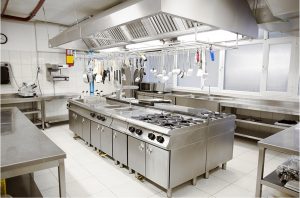Finding the perfect flooring for your commercial kitchen can be intimidating. It’s important to know what features are necessary to withstand the daily wear and tear of even the most demanding environments. From grease and oil spills to mash-ups from dropped plates, having a floor that looks good and is safe, nonporous and easy to maintain is critical.

To help you make an informed choice about what flooring is best for you, we’ve put together this guide so that you can assess the pros and cons of different types of floors designed with the unique demands of commercial kitchens in mind.
Types of Commercial Kitchen Flooring Materials
When it comes to commercial kitchen flooring, there are several options available on the market. Each material has its benefits and drawbacks, so it’s essential to consider your specific needs before making a decision.
Epoxy Flooring
Epoxy flooring is famous for commercial kitchens because of its seamless surface and resistance to stains, chemicals, and moisture. It is also highly durable and can withstand high temperatures without being damaged.
Epoxy flooring can be more expensive upfront and may require professional installation. Made up of a combination of resins and hardeners, epoxy flooring forms a tough and seamless surface that is easy to maintain and offers slip resistance, making it a safe choice for busy kitchen environments.
Epoxy flooring is customizable with various colors and patterns, allowing businesses to create a unique and appealing kitchen space. It’s a small café or a large restaurant; epoxy flooring is a smart option for any commercial kitchen looking for long-lasting, functional flooring.
Compared to other flooring options, epoxy flooring requires less maintenance and can last up to 20 years with proper care. It provides a non-slip surface that enhances the safety of kitchen workers.
Concrete Flooring
Concrete flooring is a cost-effective option for commercial kitchens, as it is easy to install and maintain. It is also highly durable and resistant to stains, chemicals, and heavy foot traffic. It can withstand heavy foot traffic and constant wear and tear from heavy machinery and equipment.
Concrete floors provide a smooth and level surface, making cleaning up spills easier and maintaining a hygienic environment.
Being long-lasting, concrete floors can also be customized with various finishes and colors to match the aesthetic of any kitchen. Concrete flooring is ideal for commercial kitchens looking for a sturdy and practical flooring solution.
Commercial Kitchen Tile Flooring
Commercial kitchen tile flooring is another prevalent choice, known for its durability, ease of cleaning, and comprehensive design options. Often made from materials like ceramic or quarry tile, this type of flooring is resistant to water, heat, and minor impacts, making it ideal for the high-stakes environment of a commercial kitchen.
Tile flooring remains cool even in high temperatures, reducing the risk of burns. However, they can become slippery when wet, so cleaning up spills promptly is crucial. The grout lines between tiles can also be challenging to clean if not sealed properly, and the tiles can crack under extreme impact.
Despite these potential drawbacks, tile flooring’s versatility in style and color and its durability and affordability make it a worthy contender for commercial kitchen flooring.
Polyurethane Resin Flooring
Due to its many desirable attributes, polyurethane resin flooring is another excellent choice for commercial kitchens. It’s known for its exceptional durability, able to withstand heavy foot traffic and resist various chemical spills. This type of flooring is also seamless and nonporous, making it an excellent choice for maintaining a hygienic environment, which is crucial in any commercial kitchen setting.
One notable advantage of polyurethane resin flooring is its thermal shock resistance. This characteristic makes it able to withstand high temperatures and sudden temperature changes, which are common in commercial kitchen operations. Moreover, this flooring can be designed with anti-slip properties, enhancing safety in a typically busy and sometimes wet environment.
It’s worth noting that polyurethane resin flooring can be customized with various colors and styles to match the aesthetic of your kitchen. However, it can be more expensive than other types of flooring and may require professional installation. Despite this, the long-term durability and low maintenance requirements make it a cost-effective investment, considering the floor’s lifespan.
Things To Consider When Choosing Commercial Kitchen Flooring
When choosing the right flooring for your commercial kitchen, there are a few factors to keep in mind:
Hygienic And Seamless
A hygienic and seamless floor is crucial for any commercial kitchen. A seamless design eliminates cracks and crevices where food particles, dirt, and bacteria can hide, fostering a cleaner work environment. This aspect is critical for kitchen staff safety and maintaining public health standards.
High-quality flooring options such as epoxy, concrete, and some tile variants offer seamless installations that promote cleanliness and ease of maintenance. Regular sweeping, mopping, and periodic deep cleaning will keep these floors spotless, ensuring the kitchen is ready to handle the rigors of daily operation while maintaining a high standard of hygiene.
Anti-Slip
Commercial kitchens are high-traffic, fast-paced environments with a high risk of slipping due to frequent spills and splashes. Therefore, flooring that offers anti-slip properties is a must. Implementing anti-slip flooring can significantly minimize the risk of accidents and injuries, safeguarding staff and operation timings.
Epoxy flooring, concrete, and certain types of tile flooring are often treated with anti-slip finishes or textures to enhance safety. Ensuring the chosen flooring material has been tested for slip resistance and meets the necessary safety standards is crucial. Remember, a non-slip floor is a safer option and an investment in uninterrupted business operations.
Hardwearing
Commercial kitchens are demanding environments where the floor is subjected to heavy foot traffic, high temperatures, frequent spills, and constant interaction with commercial-grade cleaning products. Therefore, choosing a hardwearing, durable flooring material is essential. This ensures the floor’s longevity, making it a cost-effective solution in the long run.
Epoxy, concrete, and commercial kitchen tile flooring are all known for their hard wearing nature. They can resist the heavy-duty use and the harsh conditions of a commercial kitchen, making them practical choices for this environment. Remember, investing in a hardwearing floor reduces the frequency of costly repairs and replacements, contributing to your business’s overall efficiency and profitability.
Withstand Direct Heat
With their multiple cooking stations and appliances, commercial kitchens often come into direct contact with heat. The flooring option chosen must be able to withstand this heat without its structure or appearance being compromised. Tile flooring, for instance, is known for its ability to resist heat, making it a popular choice in commercial kitchens.
Similarly, concrete and epoxy flooring can endure high temperatures without damage. When choosing your kitchen flooring, ensure it has been tested for heat resistance to prevent damage and maintain a safe working environment.
Benefits of Commercial Kitchen Flooring
Commercial kitchen flooring is an essential but often overlooked aspect of any food service establishment. The benefits of investing in quality commercial kitchen flooring are numerous.
- Provides a safe and hygienic working environment for food preparation.
- Durable and long-lasting, reducing the need for frequent repairs or replacements.
- Easy to clean and maintain, saving time and money on upkeep.
- Enhances the kitchen’s overall aesthetic, making a good impression on customers.
- It can help with noise reduction in a busy kitchen environment.
- These floors are designed to withstand heavy foot traffic and the constant movement of carts and kitchen equipment.
- They are also slip-resistant, ensuring staff and customers are safe from potentially dangerous accidents.
- Commercial kitchen flooring is typically low maintenance and easy to clean, crucial for maintaining a sanitary environment.
- The right flooring can also enhance a kitchen’s aesthetics, which can positively impact the overall dining experience.
- Investing in commercial kitchen flooring can make food preparation more efficient and keep your customers and staff healthy and happy.
Conclusion
Commercial kitchen flooring is a crucial aspect of any food service establishment and should be noticed. By choosing the right type of flooring, properly preparing and maintaining it, and avoiding common mistakes, you can ensure a safe, hygienic, and long-lasting foundation for your business. Consider the specific needs and requirements of your commercial kitchen when selecting a flooring material to reap all its benefits. With the right flooring, you can create a safe and functional environment for your staff and customers.
FAQ’s
What is the best type of flooring material for a high-traffic commercial kitchen?
Some of the most durable and popular options include ceramic tile, vinyl, and epoxy flooring.
How often should I clean my commercial kitchen flooring?
It is recommended to sweep or vacuum daily and mop with a neutral pH cleaner regularly. Spills should be wiped up immediately.
Is it necessary to seal the flooring?
It depends on the type of flooring material. Some may require regular sealing to protect against stains and moisture penetration, while others may not.
Can I install commercial kitchen flooring myself?
It is highly recommended to hire a professional for proper installation to ensure the safety and longevity of the flooring.
How can I prevent slips and falls on my commercial kitchen flooring?
Choosing a slip-resistant material and ensuring proper maintenance are vital in preventing accidents. Regularly checking for any damages or wear and tear is also essential in maintaining safety.
